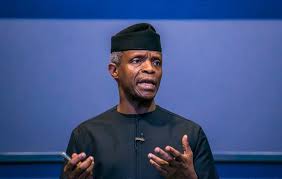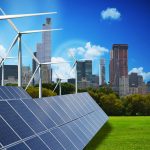FOLLOWING the global quest for commitment to zero-emission of greenhouse gases due to the threat of climate change, the global community has been advised that gas projects should not be discontinued yet, as that would hurt developing countries experiencing energy deficiency in the cause of transition.
Nigeria’s Vice President, Prof Yemi Osinbajo made the assertion on Friday during his presentation at the High-Level United Nations event on the Energy Transition plan in Africa with special focus on Nigeria which was held in London.
Join our WhatsApp ChannelAccording to a statement signed by the Senior Special Assistant on Media & Publicity, Office of the Vice President, Laol Akande, the meetings included, a closed-door session with COP26 President-Designate, Mr Alok Sharma, a cabinet rank British Minister and the Chair of the UK Government’s COP26 Energy Transition Council (ETC) at Whitehall; then an interaction with the academic community at Imperial College, followed by meetings of the Global Energy Alliance and presentations on the Nigeria Energy Transition Plan and Nigeria’s Integrated Energy Plan.
At Imperial College, Prof. Osinbajo observed that Africa as a continent is home to the world’s youngest and fastest growing population, adding that in order to create jobs and enable climate-smart industrialization, “the scale and quality of electricity services must increase significantly.”
Osinbajo stated that Nigeria has been making a commitment to the Paris Agreement on Climate Change, through efforts to exploit large shares of clean energy sources, for development.
He said, “this means building sustainability into our economic planning, and so our Economic Sustainability Plan, includes a plan to provide 5 million homes with cleaner energy through its decentralized solar power programme. This means an estimated 25 million Nigerians would have access to solar power.
“The first phase of this plan is already underway, and we think that this sort of programme will very quickly ramp up our progress towards net-zero emissions.”
He, however, pointed out that the moves to defund gas projects wouldn’t help the whole process, adding that gas is required, “especially if we are putting it on the grid. We want to be able to put renewable energy on the grid, we need power for industry, and of course, we are looking at the significant cost of that.
“Limiting the development of gas projects, poses dire challenges for African nations, while making an insignificant dent in global emissions. Energy demand in Nigeria and across Africa is set to rise, as indeed it must, to deliver the industrialization, jobs and economy-wide progress people deserve.”
The VP further explained that in the energy transition process, there is a need to link energy access element with energy emission reduction aspect.
He added, “For too long we have considered these to be parallel tracks. However, pathways to reaching net-zero by 2050 have to include first ending energy poverty by 2030.
“If energy access issues are left unaddressed, we will continue to see growing energy demand being addressed with high polluting and deforesting fuels such as diesel, kerosene and firewood.”
Osinbajo remarked that energy consumption in developing countries has doubled in the last 15 years, and was expected to rise by another 30% in the next fifteen years, adding that it requires making capital available to boost the growing energy demand in those regions of the world in order to achieve the goals of the 2015 Paris Agreement.
He also talked about disparity in global energy investments, noting that, “while representing just 15% of the world’s population, high-income countries received 40% of global energy investment in 2018. Conversely, developing countries with 40% of the world’s population received just 15% of global energy investments.”
On Nigeria’s commitment to sustainable energy, the Vice President said Nigeria has already made a commitment to have 30 percent of its electricity supply come from renewable energy sources by 2030.
He affirmed that the country is strongly committed to all its nationally determined contributions under the Paris Agreement.
“We are committed to the process and strongly believe the process has to be strong, fair, just and supported not just for Nigeria, but for most African countries and for many developing countries who have the same concerns that we have.”
Speaking about the expectations of Nigeria and other developing countries, the VP noted that “the ultimate goal of the global energy transition should be to achieve reliable net-zero-energy systems to power prosperous, inclusive economies.”
The discussions were around issues regarding the 2050 global Net-Zero emissions target and the need for the international community to align on the key elements of a just and equitable transition for all.
Victor Ezeja is a passionate journalist with seven years of experience writing on economy, politics and energy. He holds a Master's degree in Mass Communication.




















Follow Us